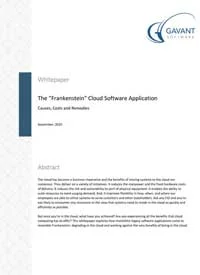A Guide to Custom Software, Part 2: Ten Benefits of Custom Software
 This series, A Guide to Custom Software, was developed to provide insight to give you an edge when making decisions about software. You can find the first entry in the series in the hyperlinked list after the jump. Next up, Ten Benefits of Custom Software.
This series, A Guide to Custom Software, was developed to provide insight to give you an edge when making decisions about software. You can find the first entry in the series in the hyperlinked list after the jump. Next up, Ten Benefits of Custom Software.
While boxed software is a perfectly viable solution for some business settings, companies often find themselves wishing for more from their technology. In our previous article, we took an objective look at custom software vs. off-the-shelf software, addressing some of the reasons an organization might opt for one approach over the other. Here, we focus on custom software and highlight some of the benefits a custom solution can provide.
Ten Benefits of Custom Software
 Take control of development. Be involved in the process from start to finish, ensuring the end result aligns with your specifications. Track important milestones and provide input if changes or additions need to be implemented. You know your business better than anyone; you need software that works to your priorities. With a custom solution, you control development of the software to make sure it does just that.
Take control of development. Be involved in the process from start to finish, ensuring the end result aligns with your specifications. Track important milestones and provide input if changes or additions need to be implemented. You know your business better than anyone; you need software that works to your priorities. With a custom solution, you control development of the software to make sure it does just that.
Include only necessary features. With custom software, you don’t have to worry about being burdened with unnecessary features that add complexity and cost. Decide what your software needs to do, and it can be designed to match that unique scenario. Gather input from stakeholders, then demonstrate that you were listening by giving them a better experience, made possible by better software. Custom software eliminates needless complexity and non-intuitive distractions to include only the functionality you deem proper.
Increase productivity and efficiency. Quality custom software is designed to match the way people work. With an intuitive user experience and simplified data entry, confusion and guesswork are removed as impediments to task completion. By streamlining and automating the various steps in a complex workflow, processes that previously took days to complete can be reduced by as much as 50% or more and the issues arising from human error can be drastically reduced.
Ensure costs are tied directly to value. While its upfront cost may equal or exceed a quality packaged system, a custom solution helps lower costs in the long run. To begin, there is no ongoing cost of seat licenses or maintenance. And because a custom solution is tailored specifically to your business processes, redundancies and bottlenecks can be eliminated, ultimately saving time, money, and productivity that would otherwise be lost with the use of a less ideal software system.
Own the IP. Off-the-shelf software works on a licensing basis; you purchase permission to use the software but you don’t own it. By contrast, it is standard practice for a custom software developer to build your solution while you retain full controllable rights to the code. The custom solution becomes an addition to your intellectual property portfolio and boosts your balance sheet. An extra benefit: you now have the opportunity to explore additional creative options such as marketing your custom software to other industry players facing the very same challenges for which you have developed a unique solution to address.
Gain a competitive advantage. A custom software solution can provide an edge, separating one organization’s offerings from others within its industry. Consider the possibility of offering your customers a dedicated portal with a professional look and feel and self-serve access to data and services not available with other competitive offerings. Or turn your focus to inside your organization by providing a continuing education platform to facilitate new employee training and share industry knowledge among more experienced employees. There are countless ways custom software can be leveraged to gain competitive advantage.
Scale your software in sync with the business. A small business generally won’t have difficulty finding inexpensive software that can perform admirably. But as a business grows, it is challenged to meet the demands of an ever changing market dynamic. Boxed software for large businesses may be overly broad and expensive, and for a small business, a non-starter. A custom software solution ensures your business doesn’t get stuck in the middle. As your company and its marketplaces evolve, so too can the software, ensuring you have the best match to meet the challenge.
React more quickly. Typically with software projects – as with most any project – unforeseen needs and adjustments arise. As your business grows or pivots, needs change and the ability to adapt your technology to these demands is paramount. When such a change or improvement is necessary, custom software, by design, allows for expedited adjustments. You’re no longer at the mercy of the packaged software developer, hoping that their roadmap and timeline for updates align with your needs and future plans.
Receive better support. Since a custom solution is designed for your environment and your specifications, the developer has a better understanding of your business functions and requirements. This fosters collaboration. When an issue arises, you have a partner to help think holistically through to the solution. It’s easier to recognize and intervene, thanks to the developer’s familiarity with the expanded environment. When opportunities arise, you’re able to address and capitalize on them much faster. The developer’s familiarity with your business will play a key role in your success.
Avoid obsolescence. Prepackaged software runs the risk of becoming outdated – or worse, “sunsetted” – due to factors that are beyond your control. When this occurs, support begins to degrade and future software updates become fewer and further between, leaving companies scrambling to address the new risks imposed upon them. By way of iterative improvement or a legacy facelift, custom software can ensure that core essential functionality is retained while new standards and trends are introduced. Functionality can always be added to help your business keep pace with the changing demands of the industry.




 Strategy for Modernizing Monolithic Applications
Strategy for Modernizing Monolithic Applications
 The "Frankenstein" Cloud Software Application
The "Frankenstein" Cloud Software Application
 A Guide to Custom Software Development
A Guide to Custom Software Development